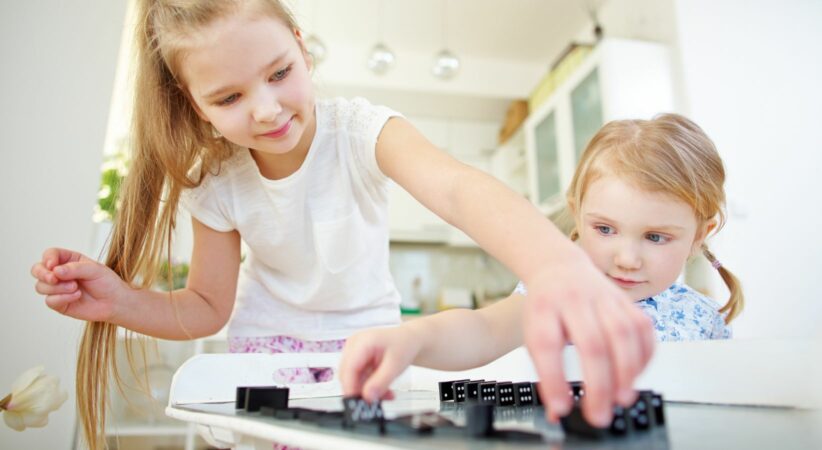
Math Games with Dominoes
Dominoes are a fun, easy and low-prep activity for learning math. They are classified as “math manipulatives,” which includes other hands-on tools such as fraction bars and counters. Math manipulatives are objects that help solidify mathematical concepts and can be virtual or physical.
Dominoes can come in a variety of formats such as the traditional wooden sets, brightly coloured dots, large floor tiles or even digital dominoes. Playing the game of dominoes is a great learning activity itself, however, there are almost endless options to the math games you can play — and concepts you can teach — with dominoes.
“Unchanging and familiar dot patterns encourage children to see numbers as being made up of component parts, and not just as a string of ones.” – Ronit Bird
There are many activities you can plan with dominoes. Here are a few examples:
Ask probing questions
Asking questions like the examples below will often lead to more questions. Using the dominoes while discussing, or thinking aloud, gives students confidence to talk through different problem solving strategies.
- how many dominoes are there in the double-six set?
- how many doubles are there?
- how many ones, twos or threes etc. are there?
- how many dominoes have a total of ten dots on them?
- how many dominoes have a total of five dots on them?
Keepers addition
This games takes two players (or two teams). Place all the dominoes face down in the centre of the table. Both players pick up a domino at the same time. Each player tells the sum of the dots on their domino (2 + 4 = 6). The player with the highest sum keeps both dominoes. If both players have the same answer, each keeps a domino. The winner is the player or team with the most dominoes when all dominoes have been picked up.
The video below offers another fun learning activity you can do with dominoes. It was created for children, but can be easily adapted for adults.
Check out the resources below for even more fun ideas for teaching with dominoes.
Resources
- BoxcarsEducation video playlist: Domino Games
- Domino cards templates and Jumbo dot pattern and domino cards by Ronit Bird
- Domino math games : connecting the dots
- Dynamic Dominoes (Toddlers/Preschoolers)
- Math Games Using Dominoes
- Using Dominoes To Teach Early Years Maths
More math fun
Related Blog Posts
Let’s Connect with Family History!
You can connect and encourage a sense of well-being and belonging by exploring your family history.
Celebrating Non-Fiction November in Canada
Let’s celebrate Non-Fiction November this month!
What is Mathematizing?
Learn about using mathematical thinking and talk during play or routine activities.
